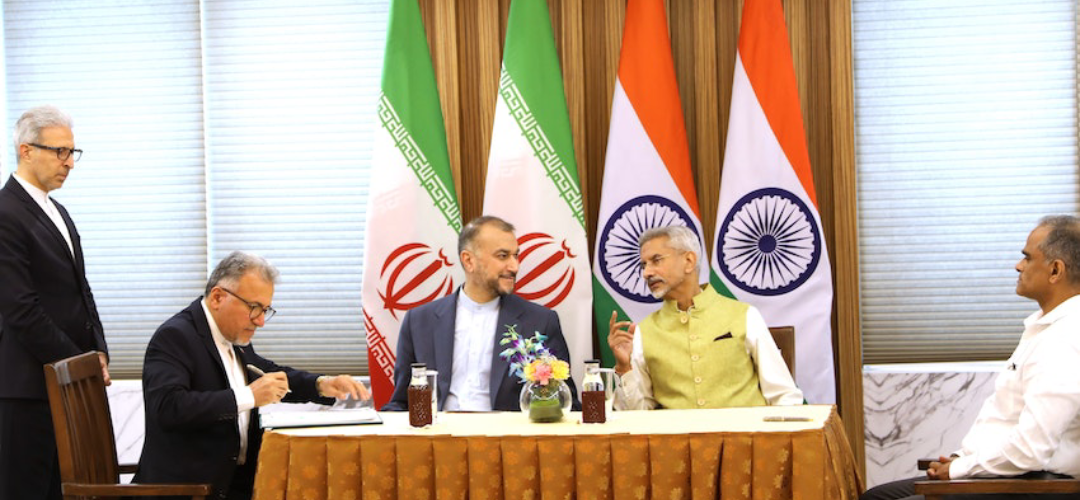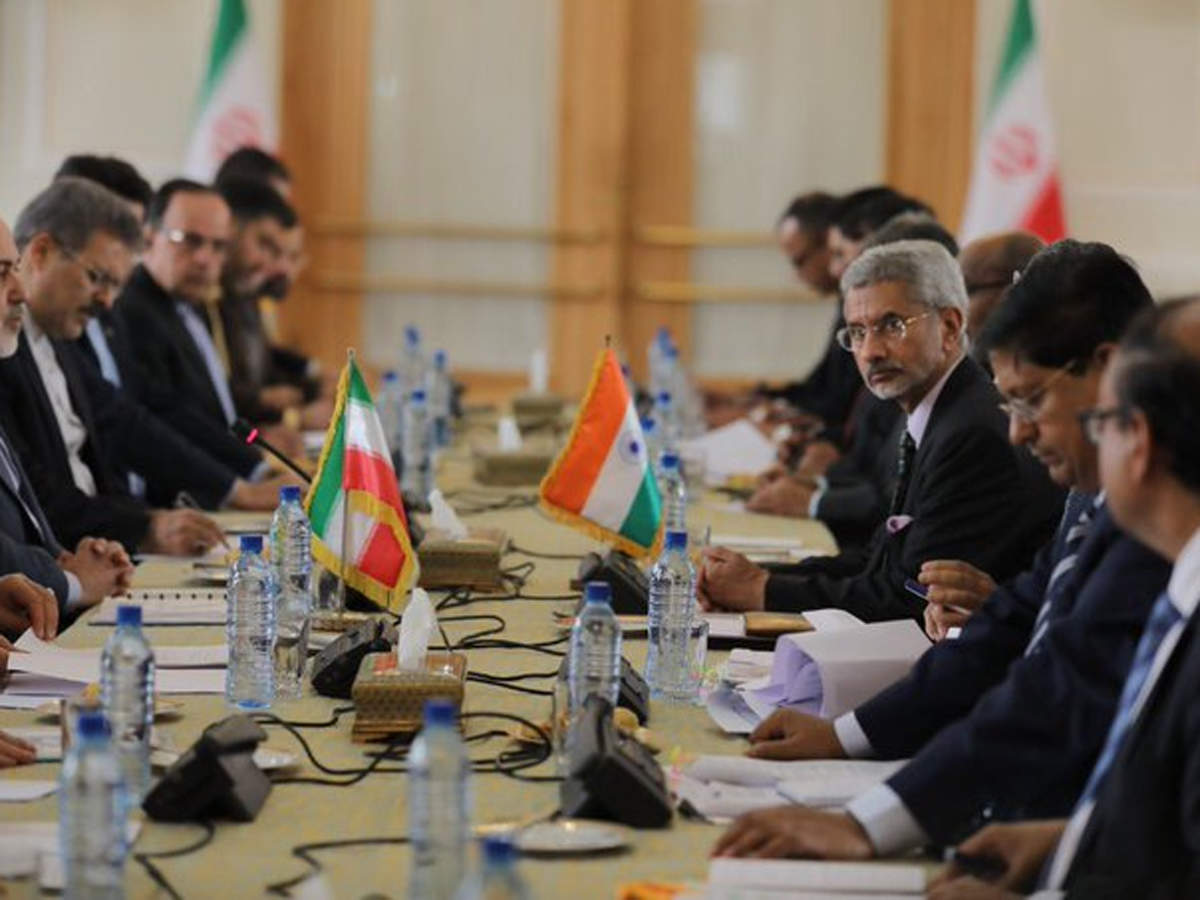Mending Fences
February 10, 2024 | Expert Insights

Decades of conflict simmer in the West Asia region, where India's recent diplomatic mission to Iran unfolded. In January 2024, Foreign Minister Jaishankar embarked on a crucial visit, navigating complex geopolitical terrain. His mission is to solidify the long-standing India-Iran ties while addressing pressing regional concerns like the Houthi-U.S. tensions and ongoing Afghan turmoil.
This visit was a tapestry woven with threads of diplomacy, seeking stability and collaboration amidst the region's volatile landscape.
Background
The intricate web of India-Iran relations stretches back millennia, underscored by cultural exchange, linguistic affinity, and vibrant trade routes. These connections have endured from the shared legacy of the Delhi Sultanate and Mughal Empire to the contemporary era, leaving indelible marks on both nations. Even the severing of their land border after partition could not sever the cordial ties that bind them.
Building upon this rich heritage, Indian External Affairs Minister S. Jaishankar's recent visit to Iran in January 2024 sought to solidify this bond and address pressing regional concerns. His visit resonated with the Iranian people when he expressed condolences for the recent terrorist attack in Kerman, underlining India's unwavering stance against terrorism in all its forms. Foreign Minister Hossein Amir-Abdollahian and President Ebrahim Raisi engaged in "substantive dialogues," as Jaishankar noted, "covering a wide spectrum of issues, encompassing political, economic, and regional matters." These dialogues went beyond platitudes, delving into the complexities of the present day.
A key issue for the discussions was the Chabahar Port project. "Recognizing its strategic significance as a gateway to Central Asia and Afghanistan," Dr. Jaishankar emphasized, "India remains committed to this project." His words echoed a shared vision with Iran, as seen in President Raisi's statement highlighting the "need to follow up and accelerate the implementation of the agreements between Iran and India, including the Chabahar Port Development Plan." This ambitious infrastructure venture, as Jaishankar envisioned, offers "a vital alternative to traditional trade routes and fostering regional connectivity." Its success could be a game-changer for both nations, unlocking economic potential and forging a stronger partnership.
However, their discussions were not without dark threads. The "turbulent West Asia region" cast a long shadow, with the "ongoing conflict in Afghanistan, the Israel-Hamas tensions, and the Houthi-U.S. confrontations" demanding attention. Both sides expressed deep concern for civilian casualties, with Dr Jaishankar stressing that India has a long-standing and uncompromising position against terrorism in all forms and manifestations. This resonated with President Raisi's call for stopping the attacks on Gaza, punishing the Zionist regime, and fulfilling the rights of the Palestinian people as the only path to stability. Their shared desire for "peaceful resolutions through dialogue and diplomacy" underscored a crucial common ground amidst the regional turmoil.

Analysis
Despite the challenges, the visit revealed hope for a brighter future. India's complete adherence to its commitments in the Chabahar port development project and comprehensive development of cooperation with Iran, as Dr Jaishankar reiterated, signalled a sustained commitment. Similarly, President Raisi emphasized the "efforts to fulfil the will of the high officials of the two countries to develop and improve the level of relations in various political, economic, science and technology, transportation and energy sectors." These statements paint a picture of a partnership moving beyond mere words towards concrete collaboration on multiple fronts.
The road ahead for the India-Iran relationship may be riddled with obstacles, but their shared history, strategic interests, and unwavering commitment to regional stability offer a sturdy foundation. Jaishankar's visit served as a crucial step in weaving a stronger bond of cooperation that holds the potential to bring peace and prosperity not just to these two nations but to the entire West Asia region.
Beyond immediate concerns, the visit also explored the possibility of a long-term cooperation agreement. Shared concerns about combating terrorism and promoting regional stability provided common ground for exploring avenues of collaboration. This forward-looking approach signifies a desire to build a robust and sustained partnership, fostering regional stability and progress. Navigating these complexities will be crucial to realizing the full potential of this collaboration.
One major hurdle is the spectre of U.S. sanctions imposed on Iran. These sanctions significantly restrict economic cooperation, making investments and trade transactions difficult. While India remains committed to the Chabahar Port project, navigating financial channels and avoiding sanctions violations pose a constant obstacle. Finding creative solutions, potentially involving alternative currencies or barter arrangements, will be essential to overcome this barrier.
The volatile situation in Yemen (where Iran is a major player and main supporter of the Houthi) and the broader West Asia region also cast a long shadow. The Houthi-U.S. tensions and ongoing conflicts threaten to destabilize both Iran and India, potentially disrupting trade routes and impacting regional security. Finding common ground on these issues while respecting each other's strategic interests will be crucial to ensuring the partnership thrives amidst regional turmoil.
Internal political dynamics in both nations also present challenges. In Iran, the upcoming presidential elections could usher in a leadership with different priorities, potentially impacting the continuity of current policies towards India. Similarly, India's domestic political landscape might influence its foreign policy choices, potentially affecting the level of engagement with Iran. Both countries must foster consensus and build broad-based support for continued cooperation to ensure long-term sustainability.
Assessment
- Beyond these immediate concerns, maritime security and energy cooperation need careful consideration. The recent rise in piracy and armed attacks in the Arabian Sea threatens vital trade routes, requiring joint efforts to ensure maritime stability. Additionally, exploring alternative energy sources and collaborating on renewable energy projects could offer mutual benefits and address concerns about regional energy dependence.
- Building trust and strengthening people-to-people ties will be crucial for a sustainable partnership. Educational and cultural exchanges, visa facilitation, and promoting tourism can foster understanding and appreciation for each other's cultures, laying a strong foundation for enduring cooperation.
- The India-Iran relationship faces a complex web of challenges. However, by acknowledging these hurdles and working collaboratively to find solutions, both nations can navigate the thorny path ahead and unlock the immense potential of their partnership for regional stability and mutual prosperity.








Comments